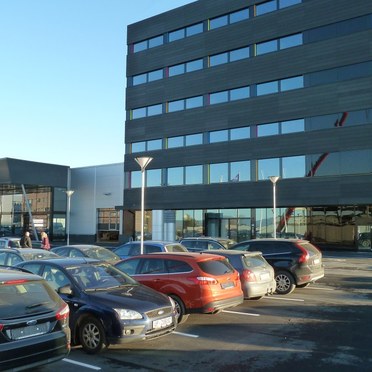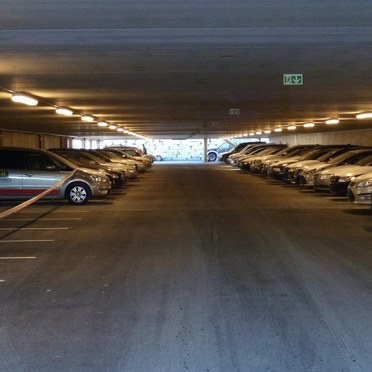Kverneland Auto Garage, Norway
- Lamp efficacy
Lamp efficacy
Ensuring the lamp efficiently converts electricity into light (lm/W).
- Ballast classification
Ballast classification
Controlling the electricity supply to the lamp (Energy Efficiency Index).
- Luminaire distribution
Luminaire distribution
Controlling light emission using optics which bend and shape the light to the correct location.
- System efficacy
System efficacy
Combining optical and thermal control within the luminaire (luminaire lm/W).
- Presence/absence detection
Presence/absence detection
Providing lighting only when it’s needed.
- Daylight detection
Daylight detection
Reducing waste light during daylight hours.
- Constant illuminance
Constant illuminance
Producing the correct lighting levels for the duration of the maintenance period.
- Task-scene setting
Task-scene setting
Allowing the user to set scenes and adapt the lighting to different tasks.
- Timed off
Timed off
Automatic cut-off to turn all lights off during unoccupied hours.
- Task lighting
Task lighting
Lighting task areas with the correct amount of light.
- Zoning of lighting
Zoning of lighting
Zoning lighting in accordance to occupancy patterns or window location.
- Maintenance schedule
Maintenance schedule
Tailoring maintenance schedules in accordance to product age, performance and environment.
- Waste light
Waste light
Eliminating waste light which does not hit the intended target.
- Reflectance
Reflectance
Taking advantage of light which is reflected from the surface within the space.
- Visible smart metering
Visible smart metering
Enabling results of actions to be quickly seen as increased or decreased energy use to encourage responsible energy consumption.
A driving force in low energy lighting
When Kverneland Auto Garage decided to convert an old seed store in Trondheim, central Norway, into a 6,300 m² area suitable for a modern car showroom and workshops, the criteria for the lighting had to change too. Good colour rendering, a high level of comfortable illumination and a commitment to sustainability and the environment were clear priorities.
The new scheme uses Thorn T5 fluorescent luminaires (Optus IV) with sensors, for detecting both daylight and presence. Depending on where the luminaires are mounted a sensor registers the daylight light level or movement in the room, and dims the light so that the amount of light is always sufficient.
The beauty of the system, according to manager Lasse Veie, is twofold. The solution provides an excellent working environment for everyone with as much or as little light as the situation requires as “the fittings feature sensors and we do not have to turn the light on and off. This is not only easy for us, it also means good economy as large rooms are not left fully illuminated around the clock”. Secondly, “we depend on our products to be exposed (presented) in a good way, and hence lighting is important.”
His judgment has been rewarded by a Class A energy rating for the building (Norwegian energy classes are labelled using letters from A to G, with A being the most efficient). Kverneland is Norway’s second, and the regions first, auto garage to gain a low energy, Class A, rating.
“We are pleased that we have found solutions that meet the requirements on the type of building we wanted to build and work in,” added Veie.
Dealerships also know the importance of well lit outdoor showrooms and forecourts. To ensure that the vehicles are presented in a proper manner, the company consulted the local Thorn Lighting manager, Knut Martin Selli, who recommended Areafloods on ten metre columns. The optical design of the Areaflood is notably different from normal area floodlights, being based on the Champion sports projector. It has an inclined front glass and integrated visor giving a full cut-off and providing a ‘virtual’ light emitting surface. The result: illuminance and uniformity are optimised, glare minimised and obtrusive light avoided.
One final refinement is that the garage wanted to get away from using unsightly emergency lighting luminaires and having to undertake regular testing, manually. The solution was to install an addressable Voyager LED emergency lighting system in the auto garage. Selli feels that LEDs are set to change emergency lighting luminaires beyond belief. “They are so much smaller with perfectly tuned optics that improve spacings, significantly reducing the number of emergency luminaires required. This means lower install cost and the longer light source life, reduced battery strain and size, and ease of testing will significantly reduce through life cost and environmental impact,” says Selli.
Kverneland Auto Garage convincingly demonstrates that with modern equipment and good lighting management it is possible for a company to dramatically improve working conditions and reduce lighting electricity consumption.


